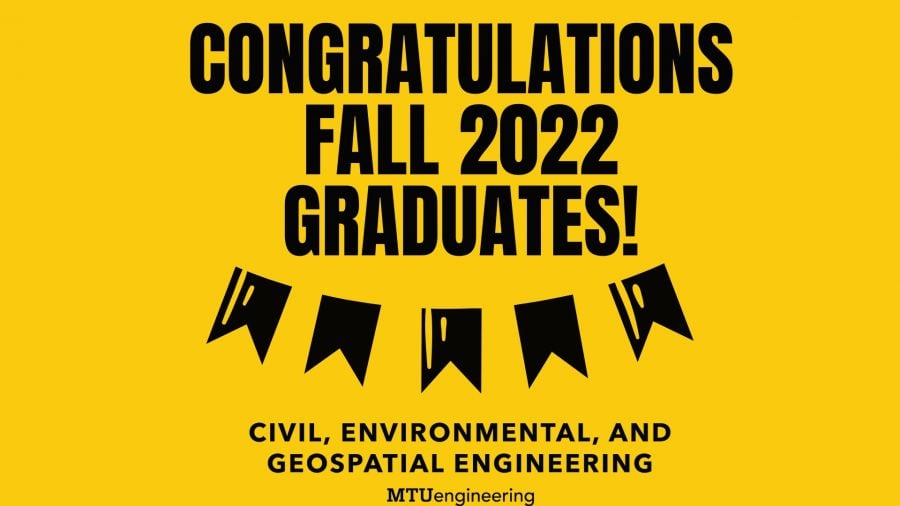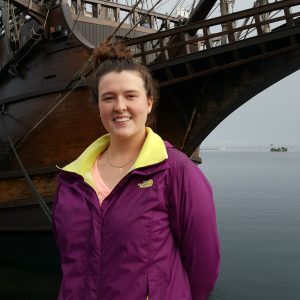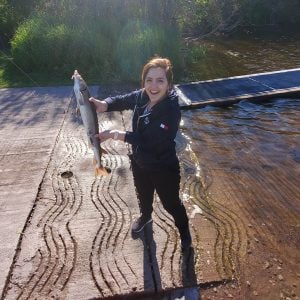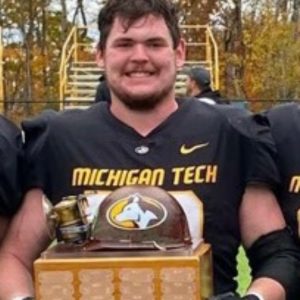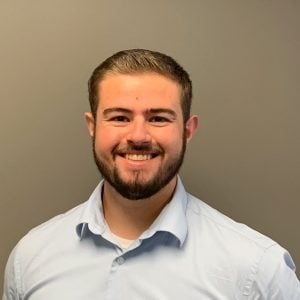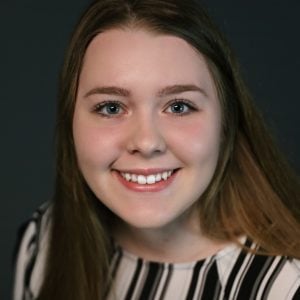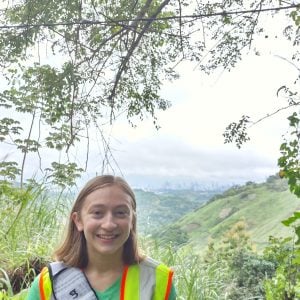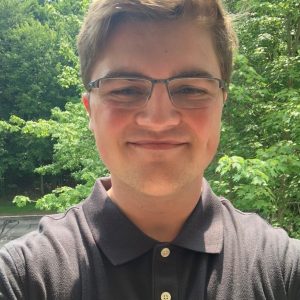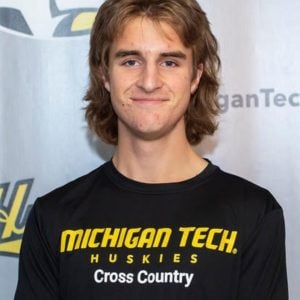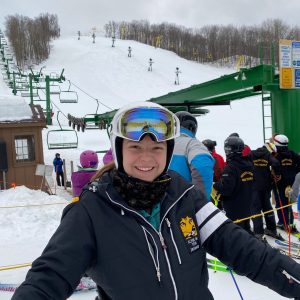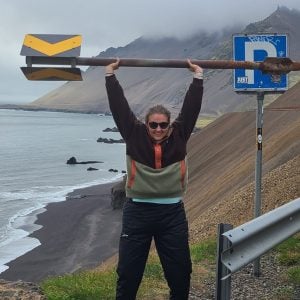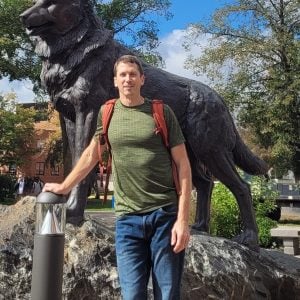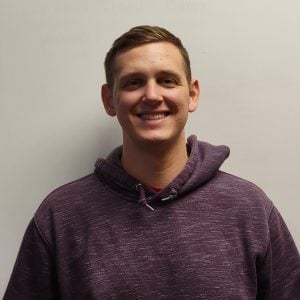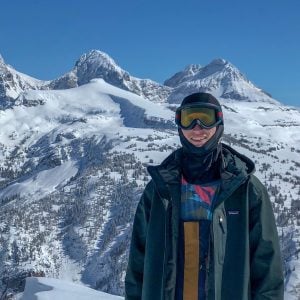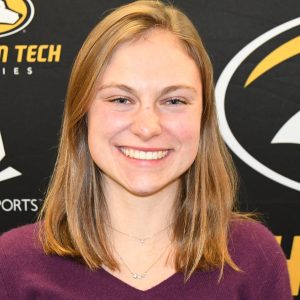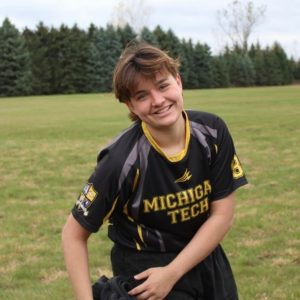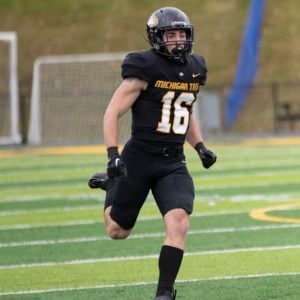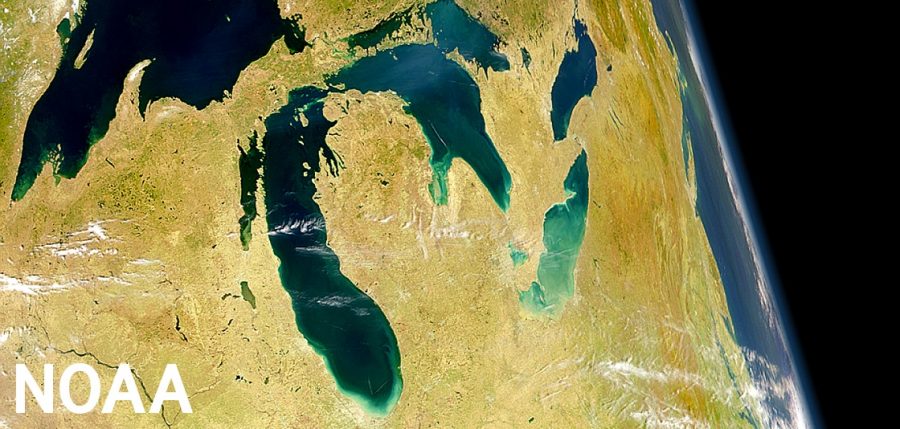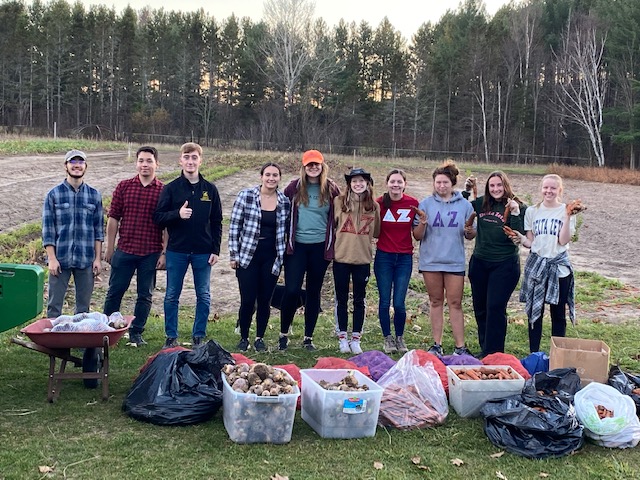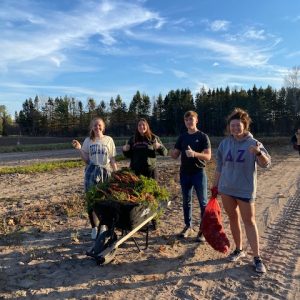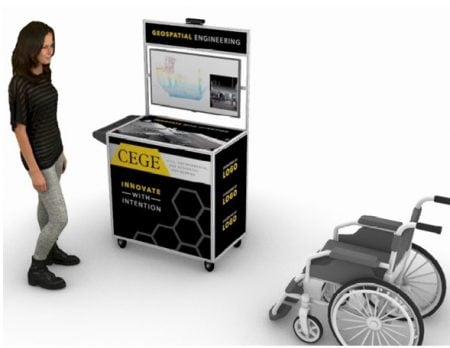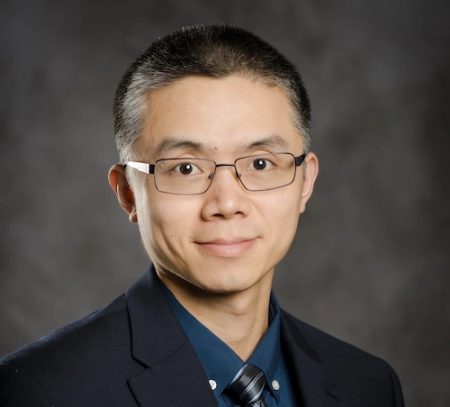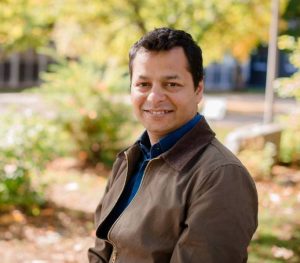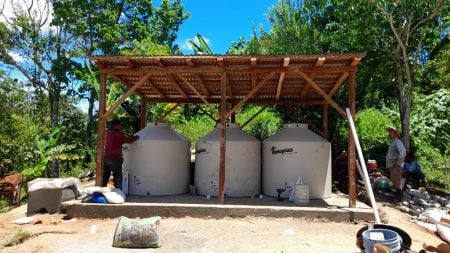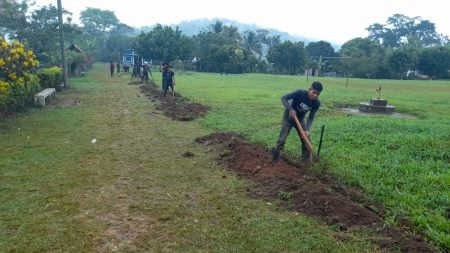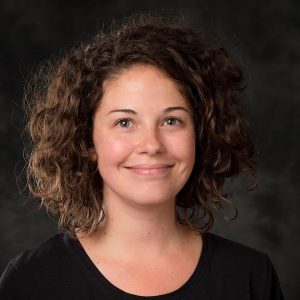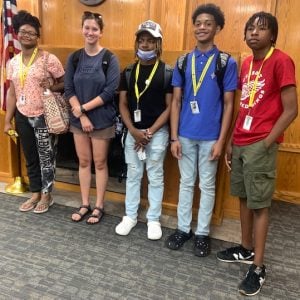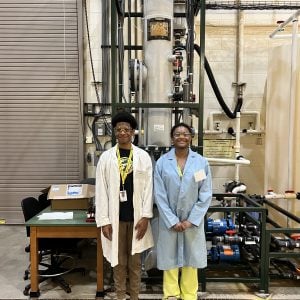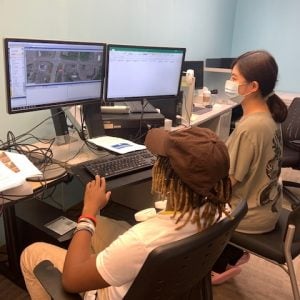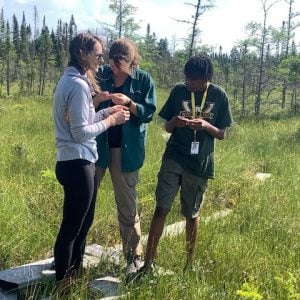The Department of Civil, Environmental, and Geospatial Engineering would like to congratulate our fall graduates and raise you up for all to see. We are proud of you and want to wish you the best of luck in your next chapter.
Presenting Our Fall 2022 Graduates:
Hailey Bedard
Hailey is graduating with a BS in civil and mechanical engineering. She says she will miss many things about Michigan Tech, but among them are all of the outdoor activities that the Keweenaw has to offer, Winter Carnival and statue building, and having the majority of her friends close by. Hailey is thankful for all the friends she has met along the way and the amazing community she has been able to be a part of. Hailey states “I would like to thank my parents, Jack and Cindy, who have supported me and encouraged me to chase my dreams every step of the way.”
Abbie Bethune
Abbie is graduating with a BS in civil engineering. She will be moving to Denver Colorado to work for GE Johnson as a Project Engineer after graduation. Abbie says she will miss the people at Michigan Tech “Michigan Tech has become my home away from home and I have been incredibly lucky with the support and community that has been a part of my experience here”. She says she is thankful to Michigan Tech for “Opportunity, from internships to sorority life I feel I have been able to have a world-class education because of MTU. I look back to the beginning of my college career here and I am amazed at how much I have grown and learned because of the opportunities Michigan tech has to offer.”
Aynaz Biniyaz
Aynaz is graduating with a PhD in civil engineering. After graduation, she will be moving to Oregon to start working full-time at Jacobs. Aynaz says she will miss Winter Carnival. She says she is grateful to Michigan Tech for providing her with the opportunities to grow in her career and would like to recognize Karen Wade from CDI as someone who made a difference to her while at Michigan Tech. Aynaz says “I would like to thank all the beautiful people from Michigan Tech who supported me during this journey.”
Gabe Bollinger
Gabe is graduating with a BS in civil engineering. He will begin working as an Associate Geotechnical Designer at Gannett Fleming in Harrisburg, PA after graduation. Gabe says that he will miss Winter Carnival and ice fishing and is thankful to Michigan Tech for challenging him in the classroom.
Sean Bonner
Sean is graduating with a BS in civil engineering. After graduation, he will be working for KPFF Consulting Engineers as a structural design engineer. He is also being commissioned into the US Army as a 2nd Lieutenant to serve in the Tennessee Army National Guard. Sean says he will miss just about everything the Keweenaw has to offer. He says “I’d like to thank Michigan Tech for giving me the opportunity to gain a world-class engineering education while funding my room and board to commission as an Army officer. I’d like to thank Dr. Kris Mattila for challenging me and making class enjoyable. I’d also like to recognize Dr. Daniel Dowden and Dr. Tess Ahlborn for sparking my passion for structural engineering.”
Curtis Byrns
Curtis is graduating with a BS in civil engineering. He will begin working for Kiewit Infrastructure Company after graduation. Curtis says he will miss the area once he leaves Michigan Tech.
Donavon Free
Donovan is graduating with a BS in civil engineering. After graduation, he will join the Army. Donavon says he is thankful for and will miss his friends at Michigan Tech and would like to recognize Jimmy Buffet as someone who made a difference to him while at Tech.
Rob Froelich
Rob is graduating with a BS in civil engineering. He will be starting his career with DAAR Engineering after graduation. Rob says he will miss the Rugby Team (Go SledDogs) and is thankful to Tech for making him more resilient.
Katherine Gallarno
Katherine is graduating with a BS in environmental engineering. After graduation, she is moving to New York to start her career working for Holcim as an environmental engineer. She plans to spend her free time traveling and exploring the state. Katherine says she will miss being a part of such a caring community that supports and encourages their peers. She is thankful to Michigan Tech for providing her with the opportunities to learn and grow as a student and as a person. When asked who she would like to recognize, she says “My family. They were my biggest supporters and I wouldn’t have made it through my degree without their constant encouragement and advice.”
Malina Gallmeyer
Malina is graduating with a BS in environmental engineering. She plans to go back downstate and work as an Engineer in Training at Fleis & Vandenbrink after graduation – “I am excited for this great opportunity and, even though I will have just graduated, I know there will be lots of learning as I start my career.” Malina said she is going to miss her St. Al’s friends so much – “Since no one goes home on the weekends, we have become like a family, and because of that leaving them behind is going to be one of the hardest things I will ever do. Even though it’s tough, I know we will all grow from the experience, and, in the end, they will only be a 9-hour car ride away.” She is thankful to Michigan Tech for the opportunities it gave her personally and professionally – “With so many clubs and organizations, I was able to find a home away from home. This made the long winter nights a little brighter and a little warmer. Professionally, the career fairs were incredible opportunities to network and meet people from many different companies.” When asked who she would like to recognize as someone who made a difference to her while at Tech “Julie Ross was amazing when figuring out how to arrange my classes to check all requirements. Coming into college with a lot of AP credit was great but I didn’t know how to use it until I met with Julie. She really walked me through everything from the beginning of my time here at Tech up until my last scheduling night. Carlos Amador was also an incredible professor. His passion for teaching Spanish and working with university students was apparent in every class. I remember meeting him before I decided on Tech and his enthusiasm and interest in what I had to say made me feel welcome. That interaction helped me to decide on Tech as my school. Now I am a Husky forever!” She ends with “Moving on from Tech is the greatest challenge yet, but, as I have learned from my time here, I should face this challenge head-on and dive into it with everything I’ve got.”
Carter Ghiringhelli
Carter is graduating with a BS in construction management. After graduation, he will be working full-time for Catamount Constructors in Denver, Colorado. Carter says he will miss the small community environment that is Michigan Tech. He is thankful to Tech for hiring great professors that care about their students’ education. Carter wanted to recognize David Nelson as someone who made a difference to him while at Tech – “He was a great professor who I enjoyed learning from in the classes I had with him.”
Sean Gulbranson
Sean is graduating with an MS in civil engineering from the online structural engineering program. Sean will continue working for Meyer Borgman Johnson, a structural engineering design and consulting firm located in Minneapolis. He says “I’m looking forward to giving back to the community by joining a planning commission in local government.” Sean says he is thankful to Tech for “the years of dedication to being a leading civil and environmental engineering school. I have been continuously impressed by the research and civil engagement that comes out of MTU every year.”
John Hardy
John is graduating with a BS in civil engineering. After graduation, John plans to start working in industry. He will miss Winter Carnival and is thankful to the Michigan Tech Football Team.
Benjamin Holland
Ben is graduating with an MS in environmental engineering. He will begin work as a Land Development Drainage Engineer for Kimley Horn in Boise, ID after graduation. Ben says he will miss the cheap housing and all the snow for great skiing and also the trails for running/biking. He says he is thankful for the CEGE Department and how great everyone is here – “I came in very interested in Water Resources and so many different people helped aid in developing significant knowledge related to my passion.” When asked if he would like to recognize someone who made a difference, Ben says “Melanie Kueber Watkins!!! Melanie is awesome! She shares a great interest in how theoretical engineering applies in industry. She tells me of her experience in work to help me get an idea for what to expect in my next steps and she greatly respects the work I do. In many different tasks, she has sent my way, she tells me I know a lot more than her (doubtful) which is at least a polite thing to say. Working under her in research over my master’s degree has been awesome because I can work on a variety of projects depending on what needs to be done and when. She gave me an experience similar to consulting as it is done in industry so she is amazing at preparing the 90% of students who graduate and leave academia for industry.”
Julia Jenaway
Julia is graduating with an MS in civil engineering. She will start working at WJE in Bingham Farms, Michigan in February 2023. Julia says she will miss the snow and the easy access to nature. She says she is thankful to have received a great education while being in a beautiful place.
Kelly Livingston
Kelly is graduating with a BS in environmental engineering. After graduation, she will move to Alaska for an environmental consulting job. Kelly says she will miss the snow is thankful to Michigan Tech for being a small campus, so walking from end to end is not hard. She would like to recognize all the professors from the CEGE department, especially Dr. Becker and Dr. Seagren.
Nathan Machiorlatti
Nathan is graduating with an MS in civil engineering from the online structural engineering program. He plans to take a few months off and then start working for a structural design engineering company. Nathan says he is thankful for all the hard work each of his professors put into teaching him and developing course content clearly and concisely. “Dr. Dai, Dr. Ahlborn, Dr. Swartz, Dr. Morse, and Dr. Webster, I appreciate all of your hard work! Thank you! Also, thank you for taking zoom meetings outside of regular office hours to answer questions that I had on class material. I appreciate Michigan Tech taking the time to create an online master’s in structural engineering which has allowed me to advance in education while being flexible on the location. I hope that the program gains further traction, and continues to enhance students’ knowledge and understanding of the structural engineering field.”
Owen Mattila
Owen is graduating with an MS in civil engineering. After graduation, he will be moving to Baraboo, WI to work as a Graduate Engineer at MSA Professional Services. Owen says he will miss reviewing homework with friends and interacting with all the professors. He says he is thankful to Tech for everyone he has met during his time here. When asked who he would like to recognize as someone who made a difference during his time at Tech, Owen says “Thanks to my dad (Dr. Kris Mattila) for all your support and encouragement.”
Jonah Meyer
Jonah is graduating with a BS in environmental engineering. He will begin work as a Public Works Engineer in Cedar Rapids, IA after graduation. Jonah says he will miss the snow and Lake Superior and is thankful to Tech for the amazing CEGE faculty and The Army ROTC Department for personal and professional development.
Benjamin Mohrhardt
Benjamin is graduating with an MS in environmental engineering. After graduation, he plans to go to Utah for the winter and then will most like come back to MTU to pursue his PhD. Ben says he will miss the snow and is thankful for all the support in obtaining his education and research goals. He would like to recognize Dr. Daisuke Minkata and Dave Perram as people who made a difference to him while at Michigan Tech.
Srujana Neyikapula
Srujana is graduating with an MS in environmental engineering. She is looking forward to working as an environmental engineer after graduation. Srujana will miss the beautiful campus, great lake, faculty, and her friends. She says “I am thankful for all the knowledge, experience, and support I have gained from Michigan Tech. Additionally, I am thankful for all the wonderful moments and memories that I have experienced as a Tech student. I would like to recognize Dr. Audra Morse for supporting me as an advisor. I truly enjoyed being a student at Michigan Technological University. I have gained great knowledge and expertise in my domain. I will cherish the memories I had as a student at Tech. I will definitely miss being at school (especially DOW & GLRC).”
Kait Pascoe
Kait is graduating with a BS in civil engineering. After graduation, she will be working a full-time position at GEI Consultants. Kait will miss the people she has met and the nature that has surrounded her during her time at Tech. She is thankful for all the connections she has made and the Michigan Tech Concrete Canoe Club.
Theresa Passe
Theresa is graduating with an MS in environmental engineering. She will begin work as a water engineer at Carollo Engineers in Boise, Idaho after graduation. Theresa will miss the snowy walks to class and is thankful o the CEGE department for helping her grow and learn. When asked if she would like to recognize someone who made a difference during her time at Tech, Theresa says “Thank you to Dr. Becker!”
Mariah Sheeler
Mariah is graduating with a BS in civil engineering. After graduating, she will start a job at UP Engineers and Architects. Mariah will miss playing on the Rugby team and is thankful for the community of students at Michigan Tech. She would like to recognize the whole membership of Alpha Delta Alpha for making a difference to her while she was at Tech. She ends with “Shoutout to the Math Lab for being an awesome place to work for the last 3 years!”
Carlin Wong
Carlin is graduating with a BS in environmental engineering. He plans to take a trip to Asia before starting work back home in Seattle for Arcardis after graduation. Carlin will miss the Keweenaw and all its beauty. He is thankful to Tech for all the great professors that care about their students’ success. “There are so many people who have helped me, but without Dr. Ross my journey at Tech would have been much longer/chaotic. I couldn’t have done it without her help. My dad received his undergraduate degree at MTU in the Spring of 1988. I cannot wait for my turn in Winter 2022.”
Scout Wunder
Scout is graduating with a BS in construction management. After graduation, he will begin working as an Assistant Project Manager for Michels Construction. Scout says he will miss being able to snowboard at any moment and all the friends he has made during his time at Tech. He is thankful to Michigan Tech for showing him how hard work can pay off in the end. “Michigan Tech has been such a great chapter in my life and I’m looking forward to what the future holds.”
Graduates Not Pictured Above
BS in Civil Engineering
Adam Bau
Christian Benson
Allyson Goff
Adam Grady
Drew Heinonen
Ethan Kangas
Jonathan Lobsinger
Mark Luebke
Scott Marvel
Kevin Tran
BS in Construction Management
Marcus Hillstrom
Troy Manthei
Graduate Certificate in Water Resource Modeling
Lauryn Roberts
BS in Environmental Engineering
Edziu Kosiara
Margaret Purvis
MS in Civil Engineering
Michael Abosede
Maria Schadow
Michael Turner
PhD in Environmental Engineering
Emily Shaw
